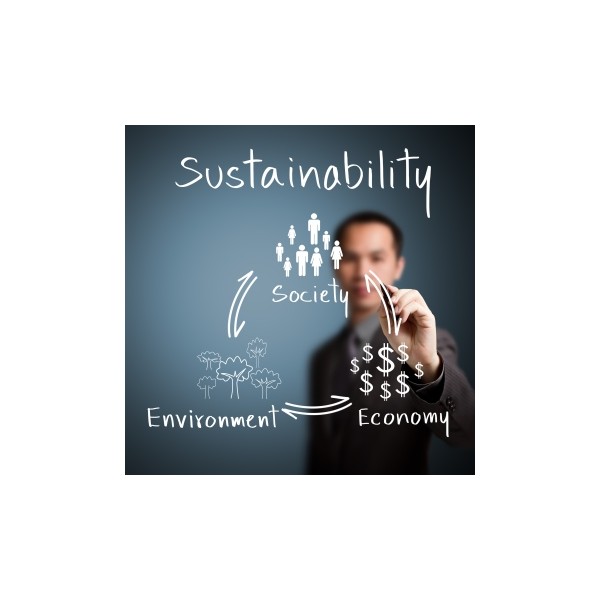Reduced price!  View larger
View larger
 View larger
View larger International Sustainability Management Eng+Rus
CER0M3
MBA-level module
No reward points for this item.
Data sheet
| Course code | CER0M3 |
| Study method | Distance learning |
| Academic level of the programme | Level 7 (postgraduate, master, MA, MSc, MBA) |
| Credits | N/A |
| Subject area | Sustainability Management |
| Programme type | Module with enclosed topics |
| Programme duration | 30 hours |
| Number of modules included | 1 in English and 1 in Russian |
| Number of topics | 10 |
| Award type | Certificate |
| Awarding body | UK Online Academy |
| Taught language | English and Russian |
| Assessment | 1 written task (1500 words +/- 10%) |
| Course will start on | every Monday |
| NOT included | Online one to one tutor, paper certificate, text books |
| Included | Course materials, end of course assessment, e-certificate of completion, 1 year access to course materials. |
| Free extras | 30 min online consultation in finding optimal education pathway |
More info
In undertaking this module you will examine the subject of business ethics and progress from a basic level of understanding to a point where you can identify the role of business in the societal context and wield the necessary tools to undertake sustainable operations.
The present module is created in full accordance with national educational standards in the field of the higher and postgraduate education, requirements of QAA UK (Quality Assurance Agency). Professors, famous in the academic world of Great Britain, the USA and Europe, took part in development of the program. The original version of the module is developed in English.
Developers of the module assume that the student already has the basic higher finished or incomplete education, is able to work independently with printing and online materials, has access to libraries, including online libraries, and also has the high level of self-discipline and motivation. Experience on the chosen subject matter is not obligatory. Knowledge of English at the level of ability to read literature is not obligatory, but it is desirable.
Module is developed for completely independent studying.
It is supposed that for successful assimilation of a training material of the module the student has to spend about 30 hours.
For a successful completion of the module the student has to execute and protect ONE written work or ONE task (usually it is work of 1,500-2,000 words +/-10%. Work shall be performed in English or in Russian.
Upon successful completion of this modules the student will receive the following type of certificate:
- Certificate on Completion of the Module.
Topics you are going to learn
1. Introduction & Definitional Problems
This session gives the student the opportunity to see where Corporate Social Responsibility (CSR) started and how this has affected its effectiveness or non-effectiveness globally.
2. CSR and Organisational Behaviour & Corporate Citizenship
This session also looks at the problems encountered in reaching an agreed definition of CSR, what it aims are and the codes and standards involved.
This session also looks at the problems with morality and CSR.
And finally, this session also deals with the ways in which corporations function internally and how that functioning can affect the wider stakeholder base. It looks at the role of corporation as a whole.
3. Stakeholders and CSR & Social Responsible Investment
This session looks at the role of shareholders in a corporations' attitude towards CSR strategy.
This also session concentrates on the impact that effective, ineffective or even fraudulent/negligent corporate governance can have upon CSR and stakeholders.
In addition to the above, this session looks at the rise of ethical investment and how corporations are either deciding for themselves, or being pressurised by outside bodies, to invest ethically rather than merely focusing on profit margins.
4. Employees and CSR & Consumers and CSR
This session deals with the role of employees as a significant part of corporation's CSR strategy. The workers are the backbone of a company and to give them ownership encourages greater commitment. One of the greatest concerns in companies at the moment is that of talented employee retention.
This session also looks at the role of consumers in determining CSR policies. The emphasis is placed upon the importance of consumer opinion and action/reaction to CSR.
5. Company Responsibility
This session looks at whether companies can be held resposible for CSR implementation outside their own sphere of overt influence, and how this is affected by the extended stakeholder theory.
6. Business and Government & Business Ethics
This session looks at the role governments play in business and how conflicts of interest, such as government ministers taking roles in business can adversely affect the balance in the corporate field. This also raises the question of corruption and self-interest.
This session also looks at the problems encountered worldwide by businesses in relation to bribery and corruption, which in some cultures is accepted as the norm. How do we define ethics, what forms does bribery and corruption take and what strategies can be implemented to deal with them? Why at the end of the day is it difficult to police such activites in a globalized world?
7. Capitalism and CSR, CSR and Supply Chains & CSR and Civil Society
This session looks at the ways in which CSR can progress given the generally capitalist society prevalent worldwide. It also deals with the untapped market at the Bottom of the Pyramid (Prahalad).
This also session also looks at the responsibilities inherent in outsourcing processes, services and products i.e. the supply chain - who is ultimately responsible? The BP oil disaster in 2010 is a prime example of this.
And finally, this session deals with the role of non-governmental organisations (NGO's) and business. What impacts can they have and what is there status?
8. SR Tools
This session deals with the possible need for CSR tools, how they relate to the various stakeholders and they can assess CSR performance - whether this is via reporting or other means, such as the input from outside bodies.
9. Environmental Issues and Theoretical Foundations of CSR
The debate continues on global warming, with the sceptics saying the subject has not been adequately researched. Despite this, we are all aware of the dangers of pollution, whether it be land, air or water, and as such, corporations are being held accountable for the part they play in safeguarding the planet for future generations.
This also session looks behind CSR, asking who is responsible for what, and what are the driving forces moving business, society and governments towards having an effective CSR strategy. Where do the ethical arguments come into play?
10. Revision
Revise all previous activities on the course. Please attempt the questions in the ACTIVITY FOLDER to help you in your assignment.
Learning outcomes
By the end of the course students should be able to:
- - Identify and critically discuss the most serious and urgent social, ethical and environmental challenges facing the world in general and business in particular
- - Understand the range of corporate responses to these global challenges, including various sustainability and responsibility models, codes and practices.
- - Identify key stakeholder groups and be aware of corporate approaches to tackling their social, ethical and environmental concerns.
- - Construct a business case for CSR.
- - Analyse the practices of companies in terms of their social, ethical and environmental performance.
- - Understand the dynamics of change and the role of change agents at a societal, organisational and individual level.
- - Recognise the limitations of current theories and practices of CSR and articulate a future strategy for the field.
Progression
Upon completion or in the first instance you can take more MBA level modules. Check courses in "other products in the same category" block just below this article.
If within the year you will complete 1-2, 3 or 5 or 8 of them you can be awarded by UK Online Academy:
- 1-2 modules - Certificate on Completion of the Module.
- 3 modules - Advanced Certificate in Business Studies.
- 5 modules - Diploma in Mini MBA programme.
- 8 modules - Advanced Diploma in Executive MBA programme.
Read more about our Mini MBA and Executive MBA programme.
Additional Services
Please check our Addons area for what else we can do for you.
Whats next
Before proceeding further please read our Admission Policy and Terms of Use.
You also may wish to check other documents and information available for Public.
If you are not registered at our Academy please do this and add to your account courses or services you need.
When you will check out and successfully pay, you will be contacted by UK Online Academy's academic coordinator within 48 working hours.
After your application form will be completed you will get a letter about your Unconditional Acceptance.
At this stage you will be given link, login and password to access UK Online Academy's LMS.
Should you have any questions please feel free to contact our team any time. Please use our contact form via button below.
We wish you good luck with your study with UK Online Academy and career progression!














